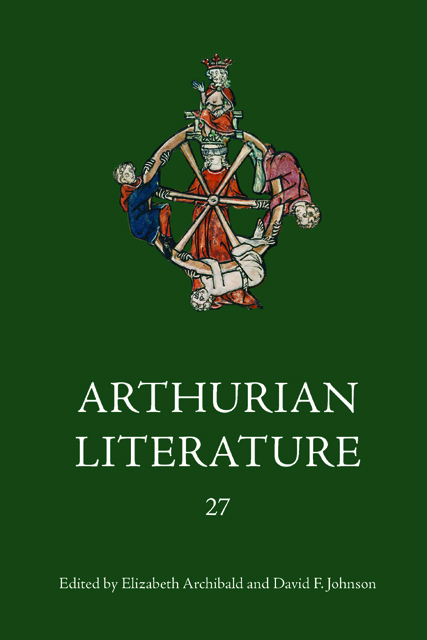Book contents
- Frontmatter
- Contents
- General Editors’ Foreword
- List of contributors
- I Commemoration in La Mort le roi Artu
- II ‘… “if indeed I go”’: Arthur’s Uncertain End in Malory and Tennyson
- III The Intruder at the Feast: Negotiating Boundaries in Medieval Insular Romance
- IV What Women Really Want: The Genesis of Chaucer’s Wife of Bath’s Tale
- V Monstrous Appetite and Belly Laughs: A Reconsideration of the Humour in The Weddyng of Syr Gawen and Dame Ragnell
- VI Speaking (of) Treason in Malory’s Morte Darthur
- VII Lancelot of the Laik: A Scottish Mirror for Princes
- VIII Prince Arthur’s Archers: Innovative Nostalgia in Early Modern Popular Chivalry
- Miscellaneous Endmatter
I - Commemoration in La Mort le roi Artu
Published online by Cambridge University Press: 18 February 2023
- Frontmatter
- Contents
- General Editors’ Foreword
- List of contributors
- I Commemoration in La Mort le roi Artu
- II ‘… “if indeed I go”’: Arthur’s Uncertain End in Malory and Tennyson
- III The Intruder at the Feast: Negotiating Boundaries in Medieval Insular Romance
- IV What Women Really Want: The Genesis of Chaucer’s Wife of Bath’s Tale
- V Monstrous Appetite and Belly Laughs: A Reconsideration of the Humour in The Weddyng of Syr Gawen and Dame Ragnell
- VI Speaking (of) Treason in Malory’s Morte Darthur
- VII Lancelot of the Laik: A Scottish Mirror for Princes
- VIII Prince Arthur’s Archers: Innovative Nostalgia in Early Modern Popular Chivalry
- Miscellaneous Endmatter
Summary
Commemoration – insofar as it is a conduit for private remembrance and public mourning – is situated between individual and communal fields of memory and marks their point of overlap. Commemoration is also situated at the intersection of individual and communal in another sense: it incorporates individual life – and death – into the public sphere and provides the means of celebrating it as exemplary. Yet, because of this peculiar status, commemoration poses the problem of what – or whom – one picks out as worthy of memory. As Judith Butler has pointed out, one of the primary functions of commemorative discourse is to designate individuals and behaviours that are considered worthy of public remembrance and thereby to identify what she terms ‘publicly grievable life’. It is precisely because it determines what kind of life qualifies for collective forms of remembrance that such discourse is instrumental in nation- or community-building. In this respect, what is excluded from the arena of public grief is at least as important as that which is included, this exclusion being a necessary condition for gestures of remembrance that help to constitute the public sphere.
One reason for re-examining commemoration in La Mort le roi Artu is that the representation of remembrance in that romance seems both to draw upon and to complicate the pattern just described in ways that comment on the text's own participation in the work of memory. Memory is represented as both an imperative and a problem in the Mort, a dynamic that manifests itself perhaps most clearly in the various monuments commemorating the dead. The romance seems repeatedly to highlight the interpretative, mutable nature of funerary text even as it asserts the relationship between historical events and the public discourse that guarantees their permanence. What is offered for commemoration within the text thus continually shifts, as what is included or excluded from memorial discourse is revisited or revised. As I shall argue, this depiction of commemoration is, in turn, connected to the Mort's awareness of its own investment in such a process, as a text that writes the final chapter of Arthurian history.
The Mort's complex attitude to memory is at least partially related to its position within a particular textual tradition.
- Type
- Chapter
- Information
- Arthurian Literature XXVII , pp. 1 - 18Publisher: Boydell & BrewerPrint publication year: 2010



